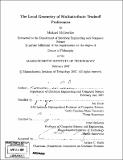The local geometry of multiattribute tradeoff preferences
Author(s)
McGeachie, Michael J
DownloadFull printable version (8.954Mb)
Other Contributors
Massachusetts Institute of Technology. Dept. of Electrical Engineering and Computer Science.
Advisor
Jon Doyle and Peter Szolovits.
Terms of use
Metadata
Show full item recordAbstract
Existing preference reasoning systems have been successful in simple domains. Broader success requires more natural and more expressive preference representations. This thesis develops a representation of logical preferences that combines numerical tradeoff ratios between partial outcome descriptions with qualitative preference information. We argue our system is unique among preference reasoning systems; previous work has focused on qualitative or quantitative preferences, tradeoffs, exceptions and generalizations, or utility independence, but none have combined all of these expressions under a unified methodology. We present new techniques for representing and giving meaning to quantitative tradeoff statements between different outcomes. The tradeoffs we consider can be multi-attribute tradeoffs relating more than one attribute at a time, they can refer to discrete or continuous domains, be conditional or unconditional, and quantified or qualitative. We present related methods of representing judgments of attribute importance. We then build upon a methodology for representing arbitrary qualitative ceteris paribus preference, or preferences "other things being equal," as presented in [MD04]. (cont.) Tradeoff preferences in our representation are interpreted as constraints on the partial derivatives of the utility function. For example, a decision maker could state that "Color is five times as important as price, availability, and time," a sentiment one might express in the context of repainting a home, and this is interpreted as indicating that utility increases in the positive color direction five times faster than utility increases in the positive price direction. We show that these representations generalize both the economic notion of marginal rates of substitution and previous representations of preferences in AI.
Description
Thesis (Ph. D.)--Massachusetts Institute of Technology, Dept. of Electrical Engineering and Computer Science, 2007. Includes bibliographical references (p. 125-129).
Date issued
2007Department
Massachusetts Institute of Technology. Department of Electrical Engineering and Computer SciencePublisher
Massachusetts Institute of Technology
Keywords
Electrical Engineering and Computer Science.